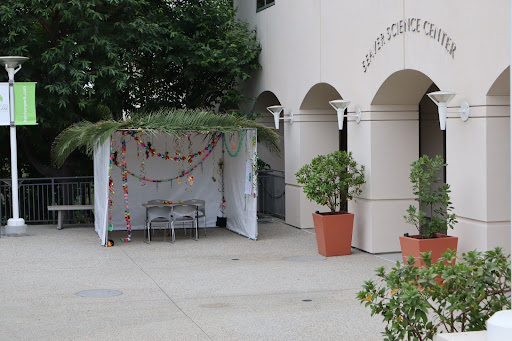As an anonymous Harvard-Westlake (HW) seventh grader exited the Munger Library, they witnessed the many complaints of their fellow classmates. These students expressed – not for the first time – annoyance at the repetitive nature of their Library and Technology class because they had already learned the skills taught in that class during elementary school.
Although HW offers its students opportunities to select their own classes and explore many subjects, there are several required courses outside of the academic core classes, including Library and Technology and Human Development. A survey sent to HW middle school students assessed the ways that the 198 respondents felt these classes could be altered to fit the needs of future students. Respondents said these courses, while intending to supplement students in various aspects of their personal and educational growth, have become outdated in the modern age and should undergo certain changes to best serve members of the HW community.
Library and Technology, often referred to as ‘Lib and Tech,’ is a mandatory class intended to teach seventh grade students computer skills and library navigation. According to seventh grade dean Kate Benton, the class was originally created to unify the technological literacy of students at a time when computers were new to the classroom. However, with the integration of technology into society, many HW students are exposed to computers T a young age and then taught technological skills in elementary school. Many surveyed students found that they had been using skills discussed in Lib and Tech for years, as 85.6 percent of respondents reported that they did not take away new information from this course.
“A lot of our students have had training at their elementary schools, and so some of the information [taught in Lib and Tech] is material they already know … I think it’s worth continually looking into that curriculum to revise it so that it stays correct,” Benton said.
Several student respondents felt the curriculum should be revised beyond efforts to simply modernize the course. Respondents reported they had learned the most during units focusing on coding or websites they had not used before. Specifically, students mentioned the units on Noodletools, citations, HTML and Microsoft Excel were educationally valuable.
Other surveyed students expressed that many of the programs covered, such as Word, Powerpoint and iMovie, were programs they had much experience with. In addition, certain units did not feel applicable to their practical scenarios and surveyed students found many of the projects to be drawn out and repetitive. They reported feeling like many of the units in the course could be condensed in order to focus on skills they hadn’t previously encountered.
While some survey respondents felt that taking Lib and Tech had advantages, only 3.3 percent of respondents believed Lib and Tech should be a mandatory course. Many expressed that if the course was to remain mandatory, fairly large changes should be made to the curriculum.
Several respondents reported that Lib and Tech would best suit their needs if its curriculum was reinvented in the mindset that most, if not all, HW students have already taken courses focusing on at least the basics of technology. Many of these students would like for the curriculum to focus on preparation for their academic futures.
“I think that Lib and Tech should be very focused on using the library tools such as looking up books, being able to use citations (the programs where you can do them), excel graphs, and other things that become more and more relevant in later years,” Aaron Cho ’22 wrote in response to the survey, “I understand that the other subjects in the class are added for fun and enjoyment of the students but solely because this course is a mandatory seventh grade course, I think it should focus on building a strong baseline for the skills that can prove advantageous to know when doing a project or assignment.”
Many respondents additionally felt that Lib and Tech should become a half or quarter year class. This proposed version of the course, which seventh grade students would be required to take first semester, would cover condensed versions of the current units on library navigation and the programs HW teachers require their students to use. During the second quarter, seventh graders could then take other electives.
An alternative solution presented by survey respondents included workshops during seventh grade class meeting, advisory or fast start, during which basic skills like navigating the hub and library could be taught. Lib and Tech could then become a programming class or an elective period for seventh graders.
In fact, 97.8 percent of survey respondents reported they would take an elective rather than Lib and Tech. Furthermore, 98.7 percent of respondents believe seventh graders should have the option to take electives.
“Taking a course [seventh graders] enjoy can help them acclimate to the school,” an anonymous survey respondent wrote. “Also, they would have a head start on prerequisites and, at the very least, would be able to explore more of what the school offers. So many courses are offered that it feels [like a missed opportunity] to not be able to take even half of them between eighth and ninth grade.”
The remaining 1.3 percent of survey respondents believe that seventh graders would be too overwhelmed by electives and should instead focus on adjusting to a new school.
“Seventh graders should get used to the school before they should be allowed to make schedule decisions like electives on their own,” an anonymous surveyed student wrote.
A compromise proposed by a number of respondents contends that seventh graders should be allowed to take electives in their second semester, allowing them time to adjust to a new school yet still be allowed to participate in a class they enjoy.
Overall, results show that while Lib and Tech is a class that holds several benefits to students’ academic futures, efforts should be taken to modernize, condense and reform the curriculum to best aid students.
All eighth grade students are required to take a semester of either Public Speaking or Debate. According to the HW curriculum guide, these courses are designed to foster critical thinking, presentation and communication skills, as well as reasoning, persuasion and argumentative skills.
Surveyed students generally enjoyed Debate with 62.3 percent of respondents saying they enjoyed and learned from the course. Many reported having fun during class and learning collaborative, organizational and argumentative skills. Furthermore, surveyed students felt they gained the confidence to speak their opinion during this class.
“Debate helps teach you about how to collaborate with a group, how to not be afraid to state your opinions and how to stay organized,” one respondent answered.
However, several shy respondents reported feeling stressed and uncomfortable during class. One anonymous respondent described debate as heightening their anxiety, which hindered their enjoyment of the course. They did not feel that they were properly introduced to the course in a safe and welcoming way, which led to hesitation when presenting or debating.
Only 28 percent of survey respondents enjoyed Public Speaking; however, 64.8 percent reported learning in this course. Several respondents wrote they learned critical skills from the course, but many also felt that there was an excessive workload and minimal time to prepare for speeches which caused increased stress and anxious feelings surrounding the course. Similar to Debate, a considerable amount of respondents expressed feelings of embarrassment and nervousness when asked to speak in class but didn&#
8217;t have the option to abstain from giving speeches.
Because these skills are viewed as crucial to academic life and success, 23.9 percent of respondents felt that Debate and Public Speaking should be mandatory. Those who felt the course should not be mandatory mostly argued that these courses do not properly address the concerns of shy and anxious students.
“Debate and Public Speaking shouldn’t be mandatory because many people don’t feel comfortable speaking in front of others, and though the classes are supposed to help people get more comfortable with it, they don’t really achieve that,” one anonymous respondent wrote.
However, several surveyed students felt creating a safer environment for such students would allow all students to learn these important skills in a more beneficial manner; many felt learning how to present is a skill crucial to success in the academic world.
“I think that Public Speaking should be mandatory for all students because although it is extremely difficult for some students to get up and speak in front of a group of their peers, the skill is extremely useful and topics covered in the class can be applied to many real situations such as job interviews or proposals,” one respondent answered.
Surveyed students also felt that skills learned in Public Speaking and Debate hold great significance in the professional world.
“As an office worker or as a politician, you will eventually have to make a speech or presentation, and public speaking will come in handy….[This is why] I believe public speaking should be required,” another respondent wrote.
According to the HW curriculum guide, Human Development 8 is a mandatory course for eighth grade students designed to inform students about choices they will face during the remainder of their adolescent years. This course has proven to be mostly useful and somewhat enjoyable: 54 percent of respondents felt they learned something in the class, and 43 percent enjoyed it.
Surveyed students reported that they learned much about not only the human body, but also the gender spectrum, sexuality, identity, drug abuse and dangers of sexually transmitted diseases. However, many survey respondents felt that the class should place a larger focus on mental health, and teachers should unify their curriculums as classes spent varying amounts of time on topics and taught different information because the class experience largely varied based on the curriculum teachers addressed and what questions they felt comfortable answering. Therefore, students from different classes were left with a large knowledge on certain topics and almost no knowledge on other topics, noting that they “learned different material than [their] friends.”
Furthermore, several respondents noted that they wish the course covered skills that are necessary for college as well as life after graduating from
“I think that Human Development should be more focused on life lessons that we don’t know yet, like filing taxes, what to do if you get into a car crash, what doctor do you go see when you go to college, etc,” an anonymous student wrote.
Despite respondents’ differences in material as well as calls for more practical material, 46.1 percent of survey respondents said that Human Development should be mandatory.
“I think human development is essential. This is by far the most important, and arguably the only important class because it teaches you about life, and I took a lot away from it,” one anonymous survey respondent answered.





